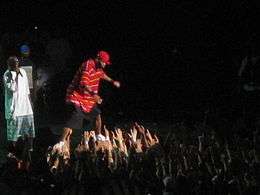Stage diving
Stage diving is the act of leaping from a concert stage onto the crowd below, which occasionally causes serious injuries. It is often the precursor to crowd surfing.[1]

Long before the word was invented, public stagediving took place during the first Dutch concert by The Rolling Stones at the Kurhaus of Scheveningen on August 8, 1964.[2]
Many musicians have made stage diving a part of their stage act. Jim Morrison was an early performer known for having jumped into the crowd at several concerts. Iggy Pop is often credited with popularising stage diving in popular rock music.[3] Initially seen as confrontational and extreme, stage diving has become common at hardcore punk and thrash metal performances.
Risks and incidents
Stage diving has occasionally caused serious injuries. One example is when Peter Gabriel of Genesis at the Friars club in Aylesbury on June 19, 1971 stage dove during the end of their song "The Knife", landing on his foot, thus spraining his ankle. On 20 August 2010, Charles Haddon, the lead singer of English synthpop band Ou Est Le Swimming Pool, died after a performance at Pukkelpop, Belgium.[4] He committed suicide by jumping from a telecommunications mast in the backstage artists' parking area. Haddon was reported to have been distressed after he feared he had seriously injured a young girl earlier after a stagedive.[5]
In 2012, singer Randy Blythe of American heavy metal band Lamb of God was indicted on (and later acquitted of) charges of manslaughter relating to the death of a fan in the Czech Republic after the fan was injured after being pushed off the stage.[6]
In February 2014, federal judge Jan E. DuBois ruled that Fishbone had to pay $1.4 million to a woman who broke her skull and collarbone during a 2010 concert in Philadelphia when Angelo Moore stage-dove and landed on top of her.[7][8]
Another fatal stage diving incident occurred in May 2014 in New York City during a performance of the metalcore band Miss May I. Although the fan was able to walk away after falling from the stage, the concert was cut short after he fainted. He later died in hospital.[9]
See also
References
- "The Evolution of Stage Diving". KCPR. Retrieved 16 February 2019.
- Rolling Stones - Live in the Kurhaus (Scheveningen, 1964) Documentary, 2011
- "20 Wildest Iggy Pop Moments". Rolling Stone. 2016-04-21.
- "Ou Est Le Swimming Pool singer Charles Haddon found dead in Belgium". The Guardian. London. 2010-08-21.
- Michaels, Sean (2010-08-25). "Ou Est Le Swimming Pool singer 'injured fan before killing himself'". The Guardian. London.
- "Soud metalového zpěváka Blytha osvobodil, je nevinen". Novinky.cz (in Czech). Retrieved 2017-02-27.
- McGovern, Kyle (14 February 2014). "Fishbone Owe $1.4 Million for Stage-Diving on Fan". Spin. Retrieved 23 April 2015.
- Dale, Maryclaire (13 February 2014). "$1.4M for woman injured by Pa. Fishbone stage-dive". Philadelphia. Associated Press. Retrieved 23 April 2015.
- Brown, Harley. "Fan Collapses Exiting NYC's Webster Hall". billboard.